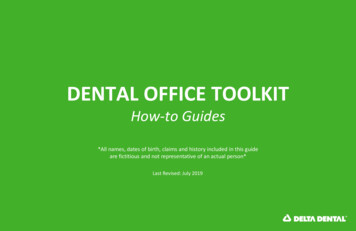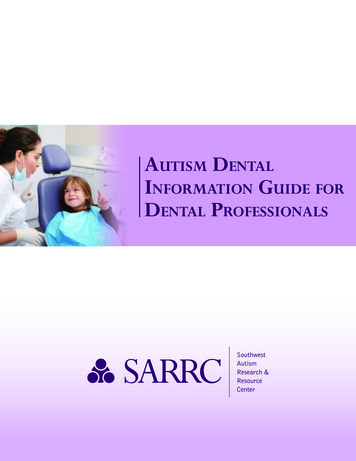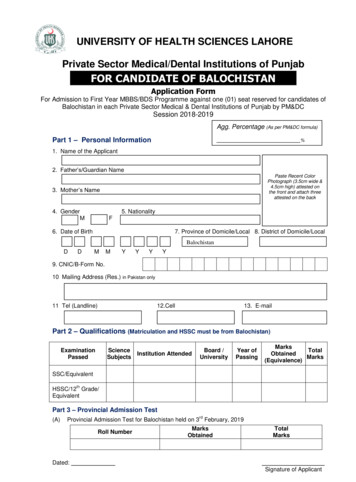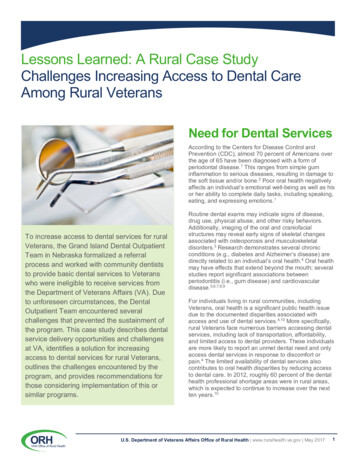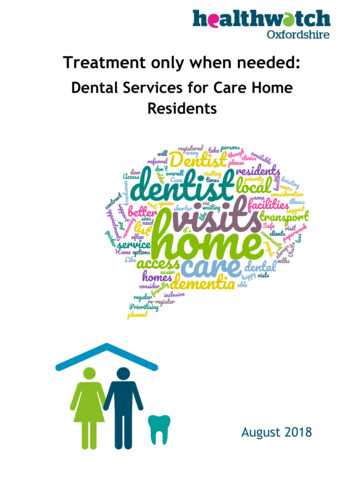
Transcription
Treatment only when needed:Dental Services for Care HomeResidentsAugust 2018
Treatment Only When Needed: Dental Services for Care Home ResidentsHealthwatch Oxfordshire would like to thank all those people who took the time toshare their experiences by: Responding to our surveySpeaking to us on the telephoneTelling us their experienceWithout you sharing your experiences this report could not have been written.Acronyms used in this report:NHS National Health ServiceGP General PractitionerTHANK YOUPage 1 of 20
Treatment Only When Needed: Dental Services for Care Home ResidentsTable of ContentsTable of Contents . 21Executive Summary . 31.1 Background . 31.2 Dentistry in Oxfordshire Care Homes: our main findings . 41.3 Suggestions for improvement . 42Setting the scene . 53Difficulty accessing NHS dentistry services in care homes . 64Use of dental services by residents . 75Barriers to care home residents accessing dental services . 85.1 Barriers to accessing an NHS dentist . 95.2 Barriers of physical access to dental surgeries . 95.3 Barriers of attitude .106Suggestions for improving access to dental services for residents . 106.1 Improved access to dentists.116.2 Improved dementia awareness among dentists .116.3 Better information on how to access dentists for residents.127Appendix 1: Survey results . 128Appendix 2: Suggestions for improvement . 159Appendix 3: Survey Questions . 1710References . 18Page 2 of 20
Treatment Only When Needed: Dental Services for Care Home Residents1Executive Summary1.1BackgroundIn November 2017, Healthwatch Oxfordshire spoke to residents in Bicester, at oneof our regular focused ‘town events’. What came to light was that some peoplewere having difficulty accessing NHS dental services. This led us to highlight theissue with NHS England Commissioners1 of dental services. As of June 2018, NHSEngland is commissioning more services for the town.It also encouraged us to look more deeply into the issue and ask ourselves severalquestions: Is access to NHS dentistry a problem in other areas of Oxfordshire? What is the public’s experience of using dentistry services? What is working well? Are there barriers to people accessing NHS dentists? Are there areas for improvement that the dental surgeries and / orcommissioners could address?To find out the answers to these questions, between February and May 2018 welaunched a county wide project focusing on NHS dentistry across Oxfordshire. Theresulting report “Filling the Gap2” contains our general findings along with thecommissioning context for dental services across the county.Potential gaps in access to NHS dentistry among the population of older residentsin care homes has been found by local and national sources, including the localDental Association, the British Dental Association (2012) and Healthwatch England(2017). This led us to complete a specific survey on this topic and this report is theresult.1Commissioners are those people who pay for dental services2Filling the Gap: age 3 of 20
Treatment Only When Needed: Dental Services for Care Home Residents1.2Dentistry in Oxfordshire Care Homes: our mainfindings1. A significant number of residents in care homes did not use dental servicesat all. One care home with 60 residents said:Acquiring dental services for care homes is very difficult2. Healthwatch Oxfordshire found that there were significant gaps in provisionof dentistry services to residents of care homes.3. Some care homes struggle to obtain NHS dental services for their residents.Barriers faced meant that many residents at care homes received no dentaltreatment at all, or only in an emergency. Barriers included:a. Lack of NHS dentists to visit a home.b. Poor physical access at dentists’ surgeries.c. Lack of transport and staff time to take residents for appointments.d. Some homes felt that dentists were unwilling or unhappy to treatpatients with dementia or learning disability.When asked how many residents did not receive dental care, one care homecommented:The majority - due to difficult accessibility treatment only when neededAs a result of our findings we will be asking the following to take action:NHS England Commissioning; Public Health Oxfordshire; Oxfordshire Association ofCare Providers; Oxfordshire County Council Adult Social Care; Care QualityCommission inspections; Oxfordshire Clinical Commissioning Group; carers groups;Oxfordshire Local Dental Committee.1.3Suggestions for improvementWe asked care homes what could be done to improve access to dental services fortheir residents and the following were suggested:1. Better access to dentists at the care home for residents who cannot easilyvisit dental surgeries2. Dementia training for dentist treating residents with dementia. This wouldalso improve the experience of people living with dementia in thecommunity3. More information available to care homes about dental services that can beaccessed by their residents.Page 4 of 20
Treatment Only When Needed: Dental Services for Care Home Residents2Setting the scenePotential gaps in access to NHS dentistry among the population of older residentsin care homes has been found by local and national sources, including the localDental Association, the British Dental Association (2012) and Healthwatch England(2017).The British Dental Association (2012) in a summary of research on dentistry in carehomes, observed that there were particular challenges presented by an ageingpopulation. The challenge for dental care for this group is particularly pertinentfor care homes.More people are keeping their own teeth into old age. As a result, accessing oralhealth and dentistry services continues to be a priority. However, the report foundthat access to dental treatment and oral health was patchy across the country andshowed high levels of unmet need among older residents in care homes. This wasseen to have a knock-on effect both on the health of care home residents, and onthe staffing capacity of care homes, as untreated oral and dental health problemsaffected nutrition intake with chewing difficulties calling for restricted diets.Homes identified the need for more formalised contracting arrangements andbudgets to be able to access routine care for older residents (British DentalAssociation 2012:3).Because of these findings, we placed specific focus on looking at NHS dentistryservices to Oxfordshire’s 138 residential care homes. Many of these homes haveresidents who have dementia, or other specific needs.Questionnaires were sent to a total of 138 homes and could be returned using a‘freepost’ envelope. This resulted in 26 care homes completing questionnaires,representing a 19% response rate.Comments and findings were collected and then grouped into themes, highlightingthe main issues that people brought to us, and were used to form the basis of thisreport. The findings are outlined according to these themes in this report.Page 5 of 20
Treatment Only When Needed: Dental Services for Care Home Residents3Difficulty accessing NHS dentistryservices in care homesHealthwatch Oxfordshire found that there were significant gaps in provision ofdentistry services to residents of care homes. Whilst some homes were happywith the service they received, or had established ties with dentists, other carehomes reported they found it difficult to access any dentists at all. These findingssupported both findings by the British Dental Association (2012), in HealthwatchEngland’s dentistry report (Healthwatch England 20163) and comments fromOxfordshire Local Dental Committee4 highlighting the problem in the county.When residents enter a care home, local links with previously used dentists may bebroken. Often it is up to the resident’s family to continue to support their lovedone to have regular check-ups. Otherwise busy care home staff are tasked withsupporting residents to attend ‘high street’ dentists. Some dentists do make visitsto care homes, if patients are private and can pay, or deemed eligible, but thispicture is very mixed across the county.We heard that as a result, many residents might not receive dental or oral healthtreatment at all, or only in an emergency. Others could only receive treatmentprivately, if they could afford it, often at a high cost.Access to dentists for patients outside the care home was a challenge. Barriersinclude physical access, staffing, transport, cost, time and logistical barriers.We also found that for some residents, particularly for those with dementia,dentists were sometimes seen as unwilling or unable to offer treatment and weresometimes lacking in understanding of this client group.We asked care homes to tell us how many of their residents accessed either NHS,or private dentistry or did not use dental services at all. Some care homes used3Healthwatch England, Access to NHS Dentistry can be read here.4Oxfordshire Local Dental Committee is the statutory representative body for NHS Providers andPerformers with whom the NHS Oxfordshire has a duty to consult over policy.http://www.oxfordshireldc.org.uk. Conversation by Healthwatch Oxfordshire with the Local DentalCommittee referred to gaps in care home provision.Page 6 of 20
Treatment Only When Needed: Dental Services for Care Home Residentsexclusively NHS services, whilst others used a mix of private and NHS, dependingon the individual residents.4Use of dental services by residentsThe chart at Figure 1 shows access to dental services by care home residents.A significant number of residents in care homes did not use dental services at all.Of the care homes we spoke to, seven care homes stated that between 20 and 50of their residents do not use dental services.Within this category of respondents, this represented at least a total of 248residents across seven care homes who do not use dental services.This included one care home of 60 residents which said the ‘majority’ do not usedental services, and another who stated that 44 residents do not use dentalservices.A further seven care homes stated that between 1 and 20 of their residents did notuse dental services.Dentists used by care home residents33%44%23%NHSPrivateNot using dental servicesFigure 1When asked how many residents do not use dental services, the care home with 60residents, including those with dementia, commentedThe majority - due to difficult accessibility treatment only whenneededPage 7 of 20
Treatment Only When Needed: Dental Services for Care Home ResidentsOne care home in the northern borders of Oxfordshire had become so frustratedwith trying to access NHS dentistry for it’ residents, including those withdementia, that they had written a letter to a local MP to highlight the issue. Thishad been subsequently raised with the then Secretary of State for Health andSocial Care, Jeremy Hunt (April 2018).They commented that:No dentist is prepared to visit a care home (service) is very poor,unable to obtain a regular dentist, oral hygienist to carry out servicesin house, without charging very high prices. Failing the residents in thehouse. Unable to provide a service when it’s not available. Have sentletter to local MP.The home highlighted that there were huge problems in finding an NHS dentist tovisit care home residents. Having contacted local dentists, the home felt thatthere was a lack of interest and negative understanding of dementia in olderadults. Some questioned the equity of why residents were expected to meet thecosts of a private dentist (of up to 500 for two hours work), meaning that thosewho could not afford to pay would be effectively withheld treatment.Comparison was drawn to people living outside in the community who had a choiceand could access NHS dentistry. The home was concerned that it was as a resultletting its residents down, and that this would negatively impact any inspections.This was contrasted to the positive cover received from other health and socialcare professionals, such as GPs, social workers and nurses.5Barriers to care home residentsaccessing dental servicesWe asked care homes to tell us about the barriers to access to dentistry servicesfor their residents. Results, shown in detail at section 7 can summed up as: Barriers of access to dentistry services (unable to find an NHS dentist, longwaiting times for appointments, and not knowing how to access NHS dentalvisits to the home) Barriers of physical access to dentist surgeries (no transport, lack ofhoisting facilities, poor wheelchair access or lack of lift)Page 8 of 20
Treatment Only When Needed: Dental Services for Care Home Residents 5.1Barriers of attitude (dentist unwilling or not able to treat disabledresidents, or those with dementia)Barriers to accessing an NHS dentistWhilst some care homes were satisfied with dental treatment, and some had longstanding arrangements for dentists to visit the home, 40% of respondents statedthat they were unable to find an NHS dentist for residents, and 12% were unsure ofhow to access NHS dental visits to the home.Unable to find NHS dentist willing to take new patients in Henley. It canbe difficult to find NHS dentists in Henley - we have to travel to Didcot.Some commented on difficulty in getting appointments for care home residents atlocal dentists.The actual dental care is not an issue.the issue is the bureaucracyinvolved in making an appointment with a community dentist. A recentrequest for an emergency appointment took 2 months. I was told that itwould be weeks or months. We gave up with the community dentist andwent to Banbury Health Centre, where we received immediatetreatment and follow up and minimal fuss to register5.2Barriers of physical access to dental surgeriesComments gave insight into the staffing and logistical problems of getting residentsto dentists outside the care home. Busy homes could ill-afford the staff time, andfamily members were not always available. This was compounded by difficulties infinding suitable accessible and affordable transport.Getting residents to the dentist is the bigger problem and do not alwayshave the staff or family to escort them Only residents who can make it to the surgery unfortunately. Verydifficult to get an appointment.then find taxi accessible forwheelchairs. Then find an escort / cover- must leave the floorTransport was often a challenge, and could be expensive, particularly forwheelchair users.Transport can sometimes be an issue and staff and families to escort.Whenever we can we try to take residents to these services; weatherpermitting, availability of staff/family to escort them, if theappointments are local and we can take them in a care or wheelchair Page 9 of 20
Treatment Only When Needed: Dental Services for Care Home ResidentsThose that need treatment and can go to local NHS dentist do so viataxi and staff cost. But is expensive for them.Many surgeries, based in traditional high streets, also had poor access, includinglimited lift and wheelchair access. Lack of hoists were also seen as a barrier by50% of respondents.5.3Barriers of attitude25% of respondents felt that there was lack of understanding of the needs ofresidents with dementia, and that dentists were either unwilling or unable to treatthis group.It is very difficult to support our dementia residents who need seeingResidents with more advanced dementia would be needed to be seen in ahospital setting, accessing Oxford Health Specialised Dental Service5.Residents with advanced dementia most of the time, need to be seen ina hospital settingLack of dental care was noted to have an impact on wider health, and on thesubsequent staffing support needs of the resident, through affecting their abilityto eatProlonged poor dental conditions sometimes affecting dietaryintake impact on staffing6Suggestions for improving accessto dental services for residentsWe asked respondents to provide their top three suggestions for improving accessto dental services for care home residents. We received 44 suggestions; fullresponses can be seen in Appendix 2.Responses can be summarised in categories as follows:5https://www.oxfordhealth.nhs.uk/service description/dental-services/Page 10 of 20
Treatment Only When Needed: Dental Services for Care Home Residents6.1Improved access to dentistsMore access to dental visits to care homes (14 comments)Greater improvement on domiciliary dentistry for residents who arefrailVisits to the home via NHSMore planned domiciliary visitsMore mobile dentistsEasier access, referrals and appointments (14 comments)Less unnecessary bureaucracyPrioritising residents in care homes- take consideration that thoughthey are registered they don’t always need the service often. So pleaseconsider not removing them from the list because its more paperwork atboth ends to re-register themShorter waiting timesBetter access, easier referralContract with local dentistThey will get in contact with care homes6 monthly checksAccess to emergency dental careImproved access to dental surgeries (5 comments)Hoisting facilitiesAccessible transport for wheelchair userswheelchair friendly clinics6.2Improved dementia awareness among dentistsTraining with dementia illnessMore awareness of needs of people with dementia. E.g. can’t beexpected to wait in waiting area for long periodsMore accommodating to persons with dementiaBetter support for dementia clientsPage 11 of 20
Treatment Only When Needed: Dental Services for Care Home Residents6.3Better information on how to access dentists forresidentsMore information to access dentist for elderlyList of NHS dentists for community servicesInform and explain GPs and care home how to access the services.7Appendix 1: Survey resultsQ.1 Name of your care home (optional)There were 26 care responses to the survey with 21 respondents naming their carehome.Q.2 Which area of Oxfordshire are you in?Which area of Oxfordshire are you in?50%40%30%20%10%0%Oxford CityWestSouth East North East South WestNorthOxfordshire Oxfordshire Oxfordshire Oxfordshire OxfordshireQ.3 What type of care home are you?What type of care home are you?50%40%30%20%10%0%Page 12 of 20
Treatment Only When Needed: Dental Services for Care Home ResidentsQ.4 How many residents do you care for?The responses indicated that the care homes who responded to this survey hadbetween 6 and 68 residents.Q.5 How many staff do you have?The care homes who answered this question had between 4 and 107 members ofstaff.Q.6 Do you take residents with dementia?Do you take residents with dementia?100%80%60%40%20%0%YesNoQ.7 How many residents use an NHS dentist?The responses indicated that some care homes had no residents using NHS dentists whilstothers had 100%.Q.8 How many residents use a private dentist?The responses indicated that some care homes had no residents using private dentistwhilst other care homes have 60% of residents using private dental services.Q.9 How many residents do not use dental services?The responses indicated that some care homes had 94% of residents not using dentalservices.Q.10 Which, if any of the following do residents receive?Which, if any of the following do residentsreceive?80%60%40%20%0%Regularcheck upsOral hygeineserviceTreatment Dentist visitsonly when to the homeneededOtherPage 13 of 20
Treatment Only When Needed: Dental Services for Care Home ResidentsQ.11 How would you rate the dental services received by your residents? (1 poor to 5excellent)How would you rate your residents dental services?(1-poor to 5 excellent)40%35%30%25%20%15%10%5%0%12345Q.12 Please tell us more about thisVery poor, unable to obtain a regular dentist, oral hygienist to carry services in housewithout charging very high prices. Failing the residents in house. Unable to provide aservice when its not available. Have sent letter to local MPAcquiring dental services for care homes is very difficultWhen we phone NHS dentist local to our home they always try and fit the resident in foran appt. Private dentists do visit the home when needed for check-up or treatment. Insome cases residents need to go to the practice for some dental work.We have a local dentist who visits the homeOur dentist at the dental practice has always shown understanding and timeResidents have a private dentist and require transport to the dentistappointment hard to getwe use a local NHS surgery and private dentist, this has been a long standingarrangementOnly residents who can make it to surgery unfortunately. Very difficult to get anappointment. Then find taxi accessible for wheelchairs. Then find an escort/ cover mustleave the floorAble to get appointmentsTime scale between appointments is very longOnly started to have this servicegood local dentist in place2 residents just applied to dentist to visit at home and awaiting their appointments.Those that need treatment and can go to local NHS dentist do so via taxi and staff cost.But is expensive for them. It is very difficult to support our dementia residents who needseeinggetting residents to services can be difficultPage 14 of 20
Treatment Only When Needed: Dental Services for Care Home Residentsprivate dentists- local not very understanding or accommodating to residents withdementiaQ 13 Which, if any, of the following barriers do you experience when accessing dentalservices?Q13.Which, if any, of the following barriers do you experience whenaccessing dental services?Other barriersNo lift or stair lift to the upper floorsPoor wheelchair access at dentistNo hoisting facilities at dentistNo suitable transport availableDo not know how to access NHS Dental visits tothe homeStaff or family member not available toaccompany residentsLong waiting lists for appointmentsDentist not willing/ able to treat residents withdementiaDentist not willing/ able to treat disabledresidentsUnable to find an NHS Dentist willing to take newpatients0%810%20%30%40%50%Appendix 2: Suggestions forimprovementQuestion 15 asked respondents for their top three suggestions for improvements;training within dementia illnesscontract with local dentistdentist visits the home and sees all residents (like Visioncall every 6 months)NHS Home VisitsPage 15 of 2060%
Treatment Only When Needed: Dental Services for Care Home Residentsmore NHS Dentist Accessregular health visits at the homenone to suggesthoisting facilitiesquicker referralsmore planned domiciliary visits?dentist to visit care homelocal dentist availablemore availability at homeoption for home visits more accessiblemore dom care visitsmore information to access dentist for elderlyhome visitsvisits to the home via NHSless unnecessary bureaucracythey will get in contact with care homesmore mobile dentistsmore accomodating to persons with dementiaequality6 monthly checksAccessible transport for wheelchair usersLike with options overall Dentist Care for those that are happySafe inclusive dental facilitiesvisiting dentist to the care homeolder people to be a priorityshorter waiting timeshave more spaces for local NHS Dentistlist of NHS dentists for community servicewheelchair friendly clinicsmore appointmentsmore dentists able to do home visitsbetter support for dementia clientsbetter access, easier referralaccess to emergency dental caretransportPage 16 of 20
Treatment Only When Needed: Dental Services for Care Home ResidentsPrioritising residents in care homes take consideration that though they are registeredthey don’t always need the service often. So please consider not removing them on thelist because it’s more paperwork at both ends to re-register them9Appendix 3: Survey Questions1. Name of Care Home (optional)2. Which area of Oxfordshire are you in?3. What type of care home are you?ResidentialNursingBothOther4. How many residents do you care for?5. How many staff do you have?6. Do you take residents with dementia?7. How many residents use an NHS Dentist?8. How many residents use a Private dentist?9. How many residents do not use dental services?10. Which, if any of the following do residents receive?11. How would you rate the dental services received by your residents? (1 poor to 5excellent)12. Please tell us more about this.13. Which, if any, of the following barriers do you experience when accessingdental services?14. Please tell us more about these barriers.15. What would be your top THREE suggestions for improving access to dentalservices for your care home residents?Page 17 of 20
Treatment Only When Needed: Dental Services for Care Home Residents10ReferencesHealthwatch Oxfordshire (2017) People’s experiences of health and social care services inBicester. November 2017. https://healthwatchoxfordshire.co.ukNHS Choices (2018) NHS Dental ices/dentists/Pages/nhs-dentalcharges.aspxNHS England (2018). NHS Dental Commissioning Statistics for England- March 2018.Published 1 May 2018. tistics/dentalcommissioning/NHS England (2017) Summary of the Dental Results from the GP Patient Survey. JanuaryMarch 2017. 6th July 2017. mary-Y11.pdfNHS Commissioning Board (2013) Securing excellence in commissioning NHS dentalservices. London: NHS Commissioning fordshire Joint Strategic NeedsAssessment (2018, 2017) gic-needsassessmentNICE (2004) Dental checks: interval between oral health reviews. Clinical guidance CG19.Oct 2004. idanceArmstrong, M. (2017) Blog: The poor state of the nation’s teeth. Can anyone be bothered?Blog. November 2 2017. ions-teethcan-anyone-be-botheredBritish Dental Association (2012) Dentistry in Care Homes research-UK. January 2012.https://www.bda.orgBritish Dental Association (2018) Campaigns. Dental contract reforms.https://www.bda.org/contractreformBritish Dental Association (2015). Dental contract reforms. What do I need to know?December 2015. https://www.bda.orgFaculty of General Dental Practice UK (FGDP(UK)) (2017) Dementia friendly dentistrygood practice guidelines. First edition. London: Faculty of General Dental Practice tia-friendly-dentistryHatton, S. (2017) NHS Contract Reform. Are you ready? 13 February 2017.www.dentistry.co.ukPage 18 of 20
Treatment Only When Needed: Dental Services for Care Home ResidentsHealth Foundation and Nuffield Trust (2017) Quality Watch Report. November 2017. Rootcauses of quality and inequality in dental ealthwatch England (2016) Access to NHS Dental Services: What people told es/healthwatch.co.uk/files/access to nhs dental services - what people told local healthwatch.pdfHealthwatch England (2017) NHS Dentistry: areas to consider. Support pack forHealthwatch. April 2017.Healthwatch England (2018) Six areas we want NHS England to focus on in 2018. as-we-want-nhs-england-focus-2018Healthwatch Oxfordshire (2018). Focus on OX4. Experiences of health and social careservices in the OX4 area of Oxford. May 2018. https://healthwatchoxfordshire.co.ukPage 19 of 20
Treatment Only When Needed: Dental Services for Care Home ResidentsRegistered Office:The Old DairyHigh Cogges FarmHigh CoggesWitneyOX29 6UN01865 520520Healthwatch Oxfordshire isa charity and a companylimited by guaranteeCompany No: 8758793Charity Number: 1172554Page 20 of 20
More information available to care homes about dental services that can be accessed by their residents. Treatment Only When Needed: Dental Services for Care Home Residents Page 5 of 20 2 Setting the scene Potential gaps in access to NHS dentistry among the population of older residents in care homes has been found by local and national sources, including the local Dental Association, the .


